|
|
|
|
|
Silicon Power 64GB 2.5" SATA SSD |
|
Join the community - in the OCAU Forums!
|
Benchmarking
So, where to begin? Other more review-oriented websites are well ahead of us in the SSD stakes; many with established libraries of drives to compare to new arrivals. As this is our first, I'll be comparing it with traditional hard drives, to give us a general idea of what to expect from SSDs as they inevitably replace hard drives. The 2.5" form factor of this drive naturally lends itself to use in laptops, where the energy savings are also welcome because they extend battery life. But I'm not really a laptop kinda guy and the box for this drive notes its suitability for notebooks, desktops and servers, so we'll be testing it for desktop use.
First up, some pure transfer speeds, courtesy HDTach 3.0.4.0. The testbed for these was as follows:
- Gigabyte GA-EP35-DS3 (P35, LGA775) Motherboard
- Intel Q6600 @ 2.4GHz CPU
- 2GB Corsair DDR2 Memory
- Leadtek GeForce 7800GT Video Card
- Windows XP SP3
This machine already has a 200GB and 250GB Western Digital and 400GB Samsung, which were tested as is with existing data. An additional 750GB Seagate (Model SV35.2, 18 months old) and 1TB Samsung (Model HD103UJ, manufactured March 2008) were formatted with NTFS defaults and used on the same controller port as the Silicon Power SSD for testing. It would have been nice to have one of the more specialised high-speed drives like a VelociRaptor, but this was unavailable for testing. The drives tested will give us a pretty good comparison with what's out there in people's PCs at the moment.
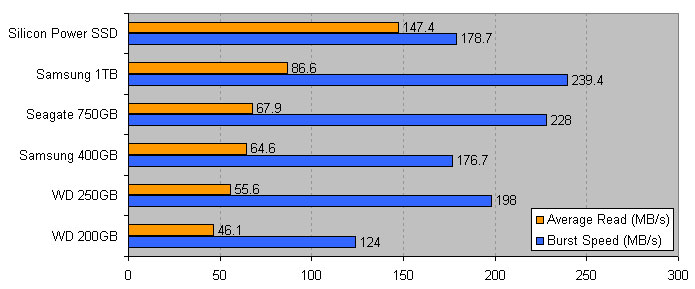
The SSD fares mid-pack for burst speed, but acquits itself very well by nearly doubling the average read speed of the nearest hard drive. It's worth taking a more detailed look at the results of the 750GB and 1TB hard drives and the SSD:
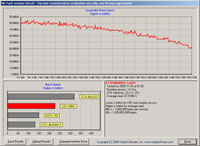 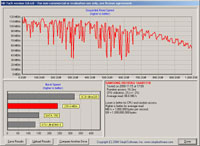 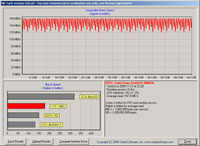
Left: Seagate 750GB HDD - Centre: Samsung 1TB HDD - Right: Silicon Power 64GB SSD
Note that the speed of the two hard drives decays as we progress along the capacity of the drive, while the SSD remains constant. This is of course due to the mechanical nature of the platter-based hard drives. As we move across the platter we experience more rotational latency and other geometry issues that affect speed. Solid-state drives have no moving parts, and indeed use a "wear-levelling algorithm" to spread the load across the individual chips that make up the unit, which gives us the nice flat transfer speed graph.
Next up, SiSoft Sandra 2009 SP1 (Beta). The built-in filesystem benchmark reports MB/s for sequential and random reading and writing. We'll stick to the three fastest drives from the previous test, again swapped in and out from the same controller port on our testbed.

Now, I know Sandra is not particularly well regarded for disk benchmarking, but there's some interesting results here. Note that the SSD blitzes the platter-based hard drives in random and sequential read, and just beats the others in sequential write. However random write, the traditional achilles heel of flash storage, sees it trail far behind.
Sandra also reports a random access time:
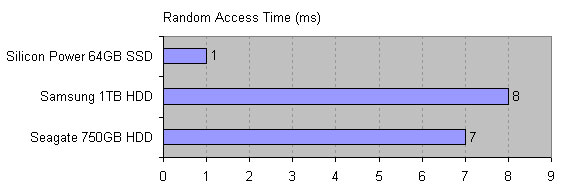
No surprises here. The hard drives have mechanical limitations to how fast they can access the desired portion of the platter. These including rotational latency while the disk rotates under the head and seek latency which is the time it takes for the head to align with the correct track of the platter. The solid state drive of course has no such issues and therefore blitzes this result.
|
|
Advertisement:
All original content copyright James Rolfe.
All rights reserved. No reproduction allowed without written permission.
Interested in advertising on OCAU? Contact us for info.
|

|


